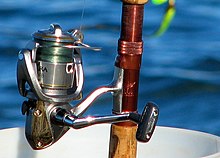Haspel
Appearance
See also: haspel
Dutch
[edit]Etymology
[edit]First attested as HASPEL (DE) in 1844. Derived from haspel (“yarn winch”). Named after a winch-shaped bend made by the nearby Grift river.
Pronunciation
[edit]Proper noun
[edit]Haspel n
References
[edit]- van Berkel, Gerard, Samplonius, Kees (2018) “haspel”, in Nederlandse plaatsnamen verklaard[1] (in Dutch), Mijnbestseller.nl, →ISBN
German
[edit]
Etymology
[edit]From Middle High German haspel, from Old High German haspil, from Proto-West Germanic *haspilaz, from Proto-Germanic *haspulaz, diminutive of Proto-Germanic *haspijǭ (“clasp; hasp; reel”). More at hasp.
Pronunciation
[edit]Audio: (file)
Noun
[edit]Haspel f (genitive Haspel, plural Haspeln) or Haspel m (strong, genitive Haspels, plural Haspel)
- reel (device for a harvesting machine)
- bobbin
- windlass
- swift, niddy-noddy
Declension
[edit]Feminine:
Declension of Haspel [feminine]
Masculine:
Declension of Haspel [masculine, strong]
Further reading
[edit]- “Haspel” in Duden online
Categories:
- Dutch terms with homophones
- Dutch lemmas
- Dutch proper nouns
- Dutch neuter nouns
- nl:Villages in Utrecht, Netherlands
- nl:Villages in the Netherlands
- nl:Places in Utrecht, Netherlands
- nl:Places in the Netherlands
- German terms inherited from Middle High German
- German terms derived from Middle High German
- German terms inherited from Old High German
- German terms derived from Old High German
- German terms inherited from Proto-West Germanic
- German terms derived from Proto-West Germanic
- German terms inherited from Proto-Germanic
- German terms derived from Proto-Germanic
- German terms with audio pronunciation
- German lemmas
- German nouns
- German feminine nouns
- German masculine nouns
